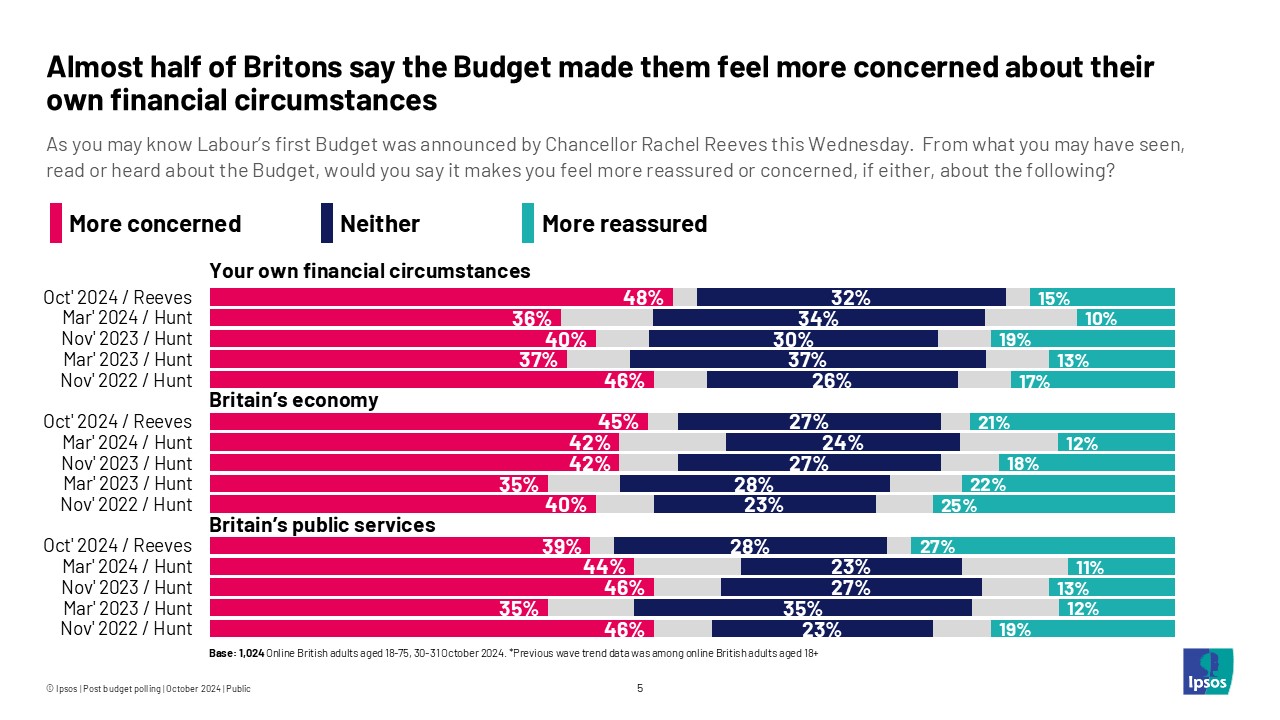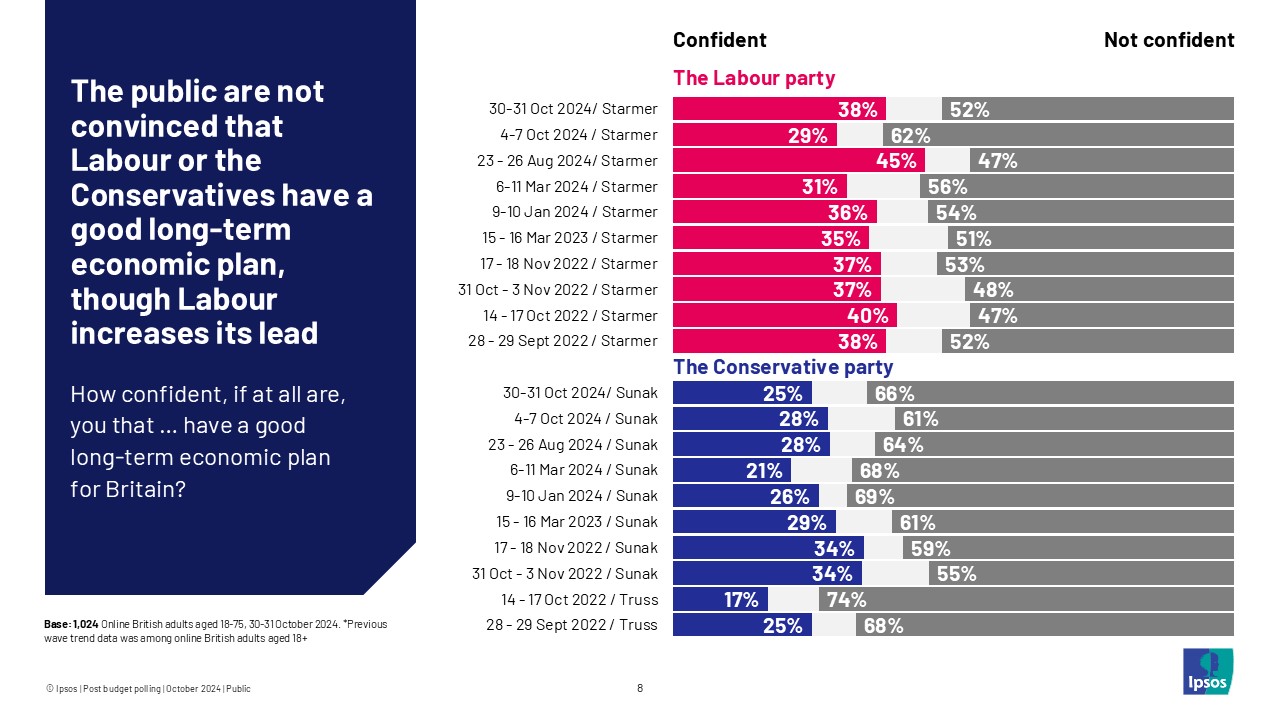Budget’s mixed reviews could illustrate lessons for Labour in the wake of Trump victory
The British public has offered a mixed response to Chancellor Rachel Reeves' first Budget, according to new research from Ipsos carried out 30-31 October 2024. The British public's multifaceted reaction to the Budget underscores the public’s anxieties surrounding the state of the economy and their personal finances, even as they show high levels of support for increased spending to improve public services and raise the National Living Wage. In the wake of Donald Trump’s election victory in the United States, where the economy and jobs were cited as a top issue for voters despite higher levels of GDP growth than the G7 average, Labour will want to ensure that they are keeping a keen eye on both how the public views the economic outlook in the UK and their satisfaction with the state of public services.
- Economic pessimism persists: 75% of Britons continue to describe the current state of the British economy as "poor," compared to just 23% who view it as "good." This negative outlook has remained consistent over recent years.
- Reeves’ favourability improves but continues to lag: A quarter (25%) of the public believes Reeves is doing a "good job" as Chancellor, an increase of +7ppts from before the Budget announcement. However, more than one in three (36%) think she is doing a "bad job," and 31% feel she is doing neither.
- Public more concerned than reassured following the Budget announcement, especially for their personal finances: Almost half (48%) of Britons say the Budget makes them feel more concerned about their personal finances, compared to 15% who feel more reassured. This is similar to the immediate public reaction to Jeremy Hunt’s Autumn Statement in November 2022. Similar levels of concern are expressed regarding Britain's economy (45% more concerned vs. 21% more reassured). Compared with Jeremy Hunt’s last Budget in March 2024, there are slightly higher numbers of the public feeling both more concerned and more reassured.
- Britons are more divided when it comes to the impact on public services, although still more concerned than reassured: Four in 10 (39%) say the Budget makes them feel more concerned about public services, vs. 27% more reassured. However, this is more positive than recent Budgets under the Conservatives; in March 2024 only 11% felt Jeremy Hunt’s Spring Budget reassured them over public services.

- Support for tax changes varies, but support for more spending on public services is high: The public support the proposed tax rises on tobacco (69%), on abolishing the “non-doms” tax regime (62%), and on North Sea oil and gas producers (58%), and also support tax reductions such as keeping the 5p reduction on fuel duty (67%), and increasing the income tax thresholds in line with inflation again from 2028 (56%). They are split on raising the rate at which employers pay NI contributions (34% support vs 36% oppose), and the rate of capital gains tax (34% support vs 30% oppose). There is high levels of support for the announcements on increasing spending on public services, particularly on fixing roads and potholes (78%), increasing NHS funding (77%), raising the National Living Wage (72%), and increasing funding for education (70%). Of the proposals asked about, increasing the cap on single bus fares receives the highest level of opposition, at 56%.
- Overall, Labour continues to lead Conservatives on the economy: While Labour maintains a lead over the Conservatives on economic trust (32% vs. 22%, little changed since before the Budget), the largest plurality (40%) trusts neither party. Furthermore, only 38% are confident in Labour's long-term economic plan – although this is an improvement from 29% at the beginning of October and remains ahead of the Conservatives on 25%.

Commenting on the findings, Gideon Skinner, Senior Director of Politics at Ipsos UK said:
The task facing Chancellor Reeves in her first Budget was clear. Britons were expecting at least some painful tax rises, but they wanted to hear how this would lead to positive outcomes for the economy and for public services. Their initial reactions have been mixed, with very few feeling more reassured about their own personal finances, and pervasive economic pessimism continuing to pose a challenge for the Labour government.
On the other hand, strong support for the measures announced to increase spending on the NHS and other public services, and minimum wage, shows the importance the public places on them; there is still a lot more to do to reassure Britons that Labour will improve public services, but there is more confidence now than under the Conservatives.
Politically, confidence in Labour on the economy remains lacking, but has shown a small uplift since before the Budget and remains ahead of the Conservatives. However, the data suggests that despite Labour's lead on economic trust, the party still needs to do more to convince the public that it can really deliver improvements, not just on the economy but on public services too. The importance of delivering improvements that people really feel in their daily lives will be emphasised for Labour following Donald Trump’s election victory in the United States, where Americans cited the economy and jobs as among the most important issues that impacted their vote, despite higher levels of GDP growth than the G7 average.
Technical note:
- Ipsos interviewed a representative sample of 1,024 Online British adults aged 18-75 between October 30th and 31st, 2024.
- Data are weighted to match the profile of the population. All polls are subject to a wide range of potential sources of error.




